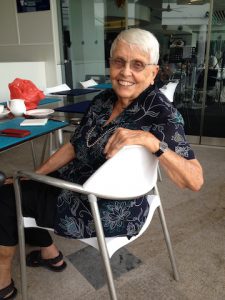The debate on euthanasia
A senior shares her viewpoint on a controversial topic.
Euthanasia has long been at the centre of many heated discussions/debates. It is mostly carried out when someone is suffering from a terminal illness as well as other arguable reasons. Currently, euthanasia is legal is several countries including Netherlands, Belgium, Luxembourg, Oregon, Montana, Vermont and Washington in the US, Colombia and Switzerland.
 Ageless Online gets a viewpoint from 85-year-old Swiss Marie-Louise Ansak (left), who was the founding executive director of On Lok in San Francisco, US, about this very controversial topic. (On Lok is a not-for-profit organisation that serves seniors in the community with long-term care and has a multi-purpose seniors centre.)
Ageless Online gets a viewpoint from 85-year-old Swiss Marie-Louise Ansak (left), who was the founding executive director of On Lok in San Francisco, US, about this very controversial topic. (On Lok is a not-for-profit organisation that serves seniors in the community with long-term care and has a multi-purpose seniors centre.)
“A discussion about euthanasia is one of the subjects that can create controversy and often bad feelings. Depending on your beliefs – your attitude toward life and death, religious beliefs and personal philosophy – a discussion about this subject can lead to severe controversy between family members and best friends. Though unavoidable at this point in view of society’s and religious groups’ positions, I feel that it is time for us to give it some serious thought. To do so and at least to come to a personal satisfactory conclusion, one should consider the following points:
• One’s own attitude and comfort with the thought of death.
• One’s very personal attitude towards religion and what euthanasia would mean to you in this regard.
Another issue of course at this point would be whether euthanasia is legal or whether you would need illegal help and what that would mean for the helper.
How could you arrange it without those who are close to you as they would in turn feel guilty. In such situations they often feel this way because they think they have failed in their attempts of support.
Personally I have considered all these issues and made arrangements to request euthanasia if my physical or mental condition no longer permits a quality of life that would not create an excessive burden for me or for those around me. I feel strongly that I will try to create a good quality of life as long as I can (impending dementia or on life support could lead to poor quality of life).
I have discussed all this with those close to me who have accepted my decision and will help me get to a place where the procedure is legal and be with me when and if the time should come.
I have now put this issue aside and am comfortable.
When it comes to a discussion about passing legislation authorising the procedure for those who want it, I think the following points should be considered:
• Do we believe in individual freedom?
• Can we develop legislation tight enough that it cannot be misused?
• How do we protect the person who provides euthanasia (legally)?
When legislation is considered … what should we also think about:
• How can we send thousands of soldiers to their death and force them to kill even if neither they nor the victims want death and are not prepared for it?
• How can many countries still have the death penalty which is an unwelcome death to the candidate and where we force an innocent bystander (executioner) to kill the person?
• Why in many countries do we encourage the use of weapons to kill other human beings?
• Why do we allow all this and forbid a suffering individual to voluntarily depart this life, particularly when they are elderly and have had a good life?”
(** EDITOR’S NOTE: This article is not meant in any way to encourage euthanasia but more as a chance to share a viewpoint.)

Euthanasia is simply doctor-aided suicide, when one is fully aware & with full knowledge of one’s decision. In Singapore, suicide is a crime & punishable by law.
Whereas “Medical Directive” prepared by oneself (when one is healthy) or by a family member is executed, when a very sick person is totally senile & has no knowledge at all. In this case, all medical support by way of oxygen equipment, external heart machine, etc is withdrawn, so that the body has no more life by itself & is then pronounced dead. In this case medical directive is allowed in Singapore within the law.